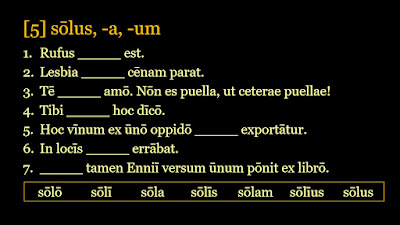utrum … an … is not an adjective but is formed
from uter
[a] utrum … an …: introduces an alternative or double
question e.g. Is it X or Y? Do you have A or B? In this type
of question utrum is not translated into English.
Utrum [i] nescīs, … an [ii] prō nihilō id
putās (Cicero) │ Is it that [i] you don’t know or [ii] do you think nothing of
it?
Utrum [i] hostem an [ii] vōs an [iii] fortūnam
utrīusque populī īgnōrātis (Livy) │ Is it the enemy, or yourselves, or
the fortune of the two peoples, that you do not know?
Utrum tū prō ancillā mē habēs an prō fīliā? │ Do
you regard me as your slave or as your daughter?
George Adler’s “Practical Grammar of the Latin Language”
provides many good, and some bizarrely memorable examples of this:
Utrum es somnīculōsus an fessus? │ Are you
sleepy or tired?
Utrum ēsūrīs an sītīs? Ego neque ēsuriō
neque sitiō.│ Are you hungry or thirsty? I am neither hungry
nor thirsty.
Utrum tibi est liber tuus an pistōris? │ Do
you have your book or the baker’s?
Utrum vīcīnī equum habēs bonum an malum? │
Have you the neighbour’s good or bad horse?
Utrum peregrīnus habet pectinēs an cultrōs
meōs? Utrōsque habet. │ Does the foreigner have my combs or my
knives? He has both.
It isn’t always the case that such double questions are
introduced by utrum. Latin has various ways of expressing the idea athough
an will most often be used to refer to the alternatives:
Vōsne L. Domitium an vōs Domitius dēseruit (Caesar)
│ Did you desert Lucius Domitius, or did Domitius desert you?
Quaerō servōsne an līberōs (Cicero) │ I ask (you)
were they slaves or free men?
Esne tū somnīculōsus an fessus? │ Are you
sleepy or tired?
Ēsūrīsne an sītīs? │ Are you hungry or
thirsty?
Tuumne librum habēs an pistōris? │ Do you have
your book or the baker’s?
Dīcam huic, an nōn dīcam? │ Shall I tell him, or
not tell him?
[b] utrum … an … can also be used as a conjunction
to introduce an indirect question, expressing “whether” and still referring to
two alternatives; note that, in indirect questions, the verb is in the
subjunctive but that is not our focus here. However, in the translations, I
have conveyed the idea of the subjunctive.
Nesciō quid intersit, utrum nunc veniam, an ad
decem annōs. │ I don’t know what difference it might make, whether I should
come now, or after ten years.
Sī quis voluerit voluntātem eius facere cognōscet dē doctrīnā
utrum ex Deō sit an ego ā mē ipsō loquar (Vulgate) │ If anyone
desires to do his will, he will know about the teaching, whether it be /
may be from God, or if / whether I may be speaking from
myself.
Quaerō, … utrum is clēmēns ac misericors an
inhūmānissimus et crūdēlissimus esse videātur (Cicero) │ I ask, whether he
might appear to be clement and merciful or most inhuman and cruel?
[c] Look out for: necne and an nōn (annōn), both of
which mean ‘or not’ which can be used to form the second part of the double
question:
Nesciō, utrum domī sit, annōn. │ I don’t know whether
he’s [ = he might be] at home or not.
Utrum cētera nōmina in cōdicem acceptī et expēnsī dīgesta
habēs an nōn? (Cicero)│ Have you all other sums of money received and
expended regularly entered, or not?
Tūne scīs utrum Vergilius praeclārissimus poēta Rōmānus
sit necne? │Do you know whether or not Virgil is the most famous
Roman poet?
Iam dūdum ego errō quī … quaeram utrum ēmerīs necne
(Cicero) │ I have been for some time acting foolishly in asking whether or
not you bought [ = might have bought] (these things)
There are various permutations for forming these double
questions; the main aim is to recognise those key words i.e. utrum, an,
necne, annōn. Here are some further examples from Cicero;
note that utrum may not always be used to introduce the first part of
the question.
Mīrāminī satis habuisse eōs quī hoc iūdicium dedērunt id quaerī,
utrum haec tam acerba, tam indigna, tam atrocia facta essent necne,
nōn utrum iūre facta an iniūriā? (Cicero)
And do you wonder that those who assigned this trial thought
it sufficient that it should be inquired whether these cruel, and
scandalous, and atrocious actions had been done or not; not whether
they had been done rightly or wrongfully?
Sunt haec tua verba necne? (Cicero) │ Are these your words, or not?
Quaesīvī ā Catilīnā in conventū apud M. Laecam fuisset necne (Cicero)│ I asked Catiline whether he had been at the meeting at Marcus Laeca's or not.



























